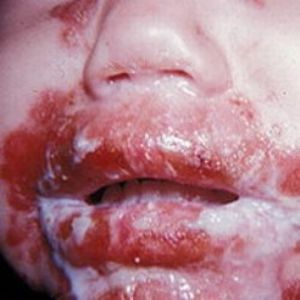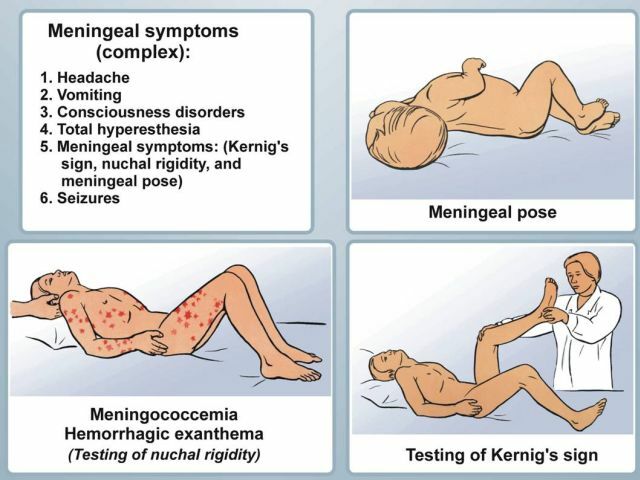 Encephalitic meningitis( another name - meningoencephalitis) is a serious infectious disease, accompanied by inflammation of the brain tissue and meninges.
Encephalitic meningitis( another name - meningoencephalitis) is a serious infectious disease, accompanied by inflammation of the brain tissue and meninges.
Encephalitic meningitis often causes serious consequences, can lead to disability and even death, to reduce the likelihood of such outcomes, timely access to a doctor, diagnosis of the disease and appropriate treatment.
What causes the disease
Meningoencephalitis can develop as a primary disease, or become a complication of other infectious diseases. In the first case, the pathogens of infection, getting into the body, affect the tissues of the brain and its membranes. One of the most frequent causes of pathologies of this type is the tick bite.
Secondary form of the disease occurs as a consequence of some infectious diseases. Most often, 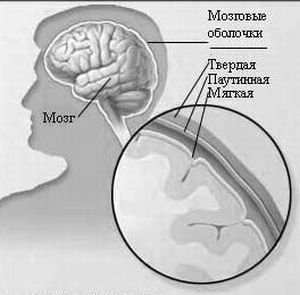 herpes, epidemic parotitis, or mumps leads to such complications, as well as autoimmune diseases.
herpes, epidemic parotitis, or mumps leads to such complications, as well as autoimmune diseases.
In addition, secondary encephalitic meningitis can develop with complications of such diseases as sinusitis, rheumatic pathologies, inflammation of purulent gingival tissue, tonsillitis, purulent otitis, sinusitis and others.
There are cases of development of postvaccinal and allergic encephalitic meningitis. This occurs when there is an allergic reaction to the injected drug. A particular danger of this form of the disease is the rate of its development.
With postvaccinal encephalitis meningitis, the brain is affected very quickly, which often causes disability or death of the patient.
Transmission routes and incubation period of the disease
The most common way of transferring meningoencephalitis is infection through the bite of an encephalitis mite. These insects 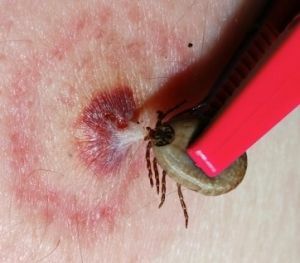 are vectors of the virus that causes brain tissue damage. The main distribution area for this type of mite is the northern part of Russia and Siberia.
are vectors of the virus that causes brain tissue damage. The main distribution area for this type of mite is the northern part of Russia and Siberia.
In some cases, the disease can develop with the use of infected cow or goat milk, if it has not been subjected to a preliminary heat treatment.
Secondary encephalitic meningitis can result from inflammatory diseases of the ENT organs and oral tissues, especially if they become purulent. The defeat of brain tissue and its membranes can occur with a strong decrease in immunity and infection with certain infections( measles, rabies, rubella, influenza and others).
The incubation period for primary infection through a tick bite can be from 1 day to a month, depending on the individual characteristics of the patient. In most cases, it is within 5-14 days. During this period the infection manages to penetrate into the cells of the body and begin to multiply, while the human immunity still tries to cope with it on its own.
All about pneumococcal infection that causes pneumococcal encephalitic meningitis:
Features of
manifestation At the initial stage of the disease, a person usually complains of a migraine, severe fatigue, apathy, exhaustion, lack of appetite, irritability, muscle weakness and joint pain. The duration of this period can be different - from several hours to several days.
Then the disease goes to the acute stage. To the listed symptoms, a strong runny nose, dryness in the throat and an angry cough are added. The patient raises the temperature, reaching a mark of 40 degrees and above, while knocking it down is quite difficult.
Neurological symptoms are divided into meningeal, cerebral and focal syndrome, which can be combined in various combinations and have varying degrees of severity.
The manifestations of meningeal syndrome include signs of brain damage: severe headaches, vomiting and nausea, increased sensitivity to touch, loud sounds, bright light and other irritants, stiff neck muscles and so on.
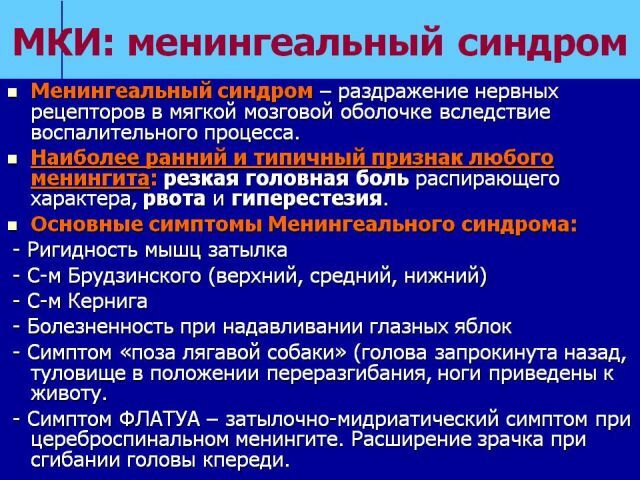
The main cerebral symptom is a violation of consciousness, which can have a different degree of severity: from mild stun to coma. There are possible such manifestations as delirium, hallucinations, acute psychoses, psychomotor agitation. Often, patients are disturbed by sleep.
Focal symptoms can be different, it depends on the form of the disease and the affected area. The most frequently observed vestibular disorders, manifested by impaired coordination and severe dizziness. With encephalitis meningitis, disturbances in the work of the visual organs may occur, such as strabismus, omission of the eyelid, nystagmus, and others.
Diagnosis and therapy
To confirm the diagnosis, a spinal puncture is performed. It involves puncturing the spinal cord and picking up the cerebrospinal fluid for analysis. When carrying out this diagnostic procedure, you should pay attention to the fluid pressure.
A marked increase in it is also a symptom that confirms the diagnosis of "encephalitic meningitis".As a result of the analysis of cerebrospinal fluid, the presence of an inflammatory process is detected and an infectious agent is established.
The diagnostic procedure for taking cerebrospinal fluid for analysis is also a first aid method to help reduce intracranial pressure in 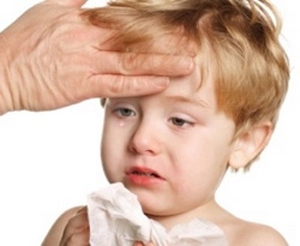 .
.
After this procedure the patient's condition improves somewhat. According to the results of spinal fluid analysis, the doctor prescribes the necessary course of treatment, which includes anti-inflammatory drugs, drugs that inhibit the causative agents of infection( antibiotics, antiviral and antifungal agents), medicines aimed at maintaining and strengthening immunity.
Among other things, prescribe drugs that are aimed at eliminating certain symptoms and manifestations of encephalitic meningitis. In the treatment of this disease hormones can be used.
Treatment of encephalitic meningitis includes a long period of rehabilitation, the duration of which depends on the degree of brain damage.
At this stage, the patient is prescribed neuroprotectors, drugs that improve cellular metabolism, antioxidants, sedatives, vitamins and other drugs. In addition to drug therapy, in the rehabilitation period the patient is prescribed physioprocedures and reflexotherapy.
Prognosis and possible complications of
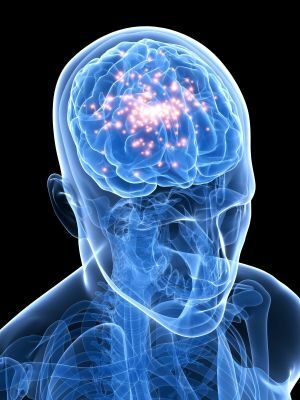 With timely diagnosis, fast hospitalization and full treatment, there are quite a few chances of a favorable outcome of the disease. However, there is no guarantee for a complete cure even in this case.
With timely diagnosis, fast hospitalization and full treatment, there are quite a few chances of a favorable outcome of the disease. However, there is no guarantee for a complete cure even in this case.
Mortality from encephalitic meningitis, especially with disregard for medical care, is very high. Also, this pathology can cause disability.
Most of the people who have had the disease, face any of its complications, especially they develop with untimely started treatment and in elderly and weakened patients.
The consequences of encephalitic meningitis include memory loss, mental changes, aphasia, epilepsy and others.
Prevention of
violation Since the most common cause of this disease is a tick bite, vaccination can be provided for preventive purposes. 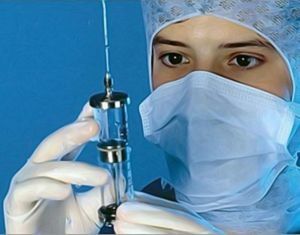
It should be remembered that the action of the vaccine on the body lasts only four years. Visiting forests and groves in encephalitis tick habitats, it is worth choosing such clothes and shoes that minimize the probability of an insect bite.
If the tick still bites, then it must be carefully removed from the skin and taken to the hospital for the study.
In addition, for the prevention of disease, it is necessary to treat inflammatory-infectious diseases in a timely manner and if you have suspicious symptoms, you must always seek medical help.

